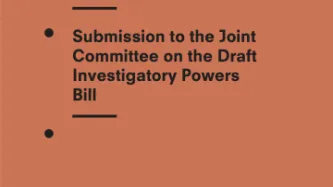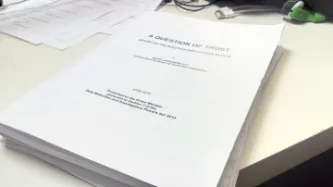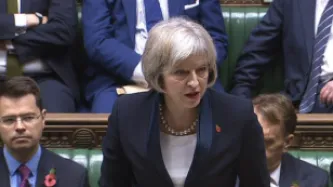Search
Content type: Press release
Today Sir Stanley Burnton, the Interception of Communications Commissioner, published a highly critical review of the use of Section 94 of the Telecommunications Act 1984 for gathering vast amounts of our communications data in bulk. This obscure clause pre-dates the internet era, but has been used for nearly two decades for mass surveillance. Today is the first time that these powers have been criticised by an independent statutory body. IOCCO is critical of the Government's use of these…
Content type: Press release
Tomorrow, on 26 July, the main hearing will begin in Privacy International's legal challenge against MI6, MI5, and GCHQ's collection of bulk communications data and bulk personal datasets. Previously secret documents will be made public at the hearing, and Privacy International will brief attending journalists about the significance of the disclosed documents.
The hearing will include references to important documents detailing the collection of data on every citizen in the…
Content type: Press release
Harmit Kambo, Campaigns Director, Privacy International said
"The overwhelming vote by MPs last night in favour of massively intrusive new state surveillance powers represents both a failure of the democratic process and a grim watershed moment for the privacy of every one of us.
Over the course of the Bill Committee stage, Privacy International, alongside experts from academia, technology firms, the legal profession, human rights organisations, and civil liberties groups have proposed over…
Content type: Press release
Privacy International releases previously confidential correspondence between lawyers for MI5 and GCHQ and the former Interception of Communications Commissioner, highlighting problems with the relationship between the two bodies
The correspondences show a lack of meaningful oversight and restraint of UK surveillance agencies
Ahead of the vital commons vote on the Investigatory Powers Bill, we need to create a system that guarantees better oversight of surveillance powers…
Content type: News & Analysis
Another committee-led scrutiny. Another list of changes that need to be made to the Investigatory Powers Bill. This seems familiar.
The Joint Committee on Human Rights has weighed in with scrutiny of the Investigatory Powers Bill prior to the Bill’s debate and vote in the House of Commons on the 6 and 7 June. The recommendations the report contains once again raise questions about the fitness of the Bill to be passed in its current form.
The Committee identified thematic warrants - which…
Content type: News & Analysis
Thank you to those of you who joined our campaign, 'Did GCHQ Illegally Spy on You?'. If you made a claim to the Investigatory Powers Tribunal (IPT) - the court that hears claims about surveillance by public bodies, including the intelligence agencies - to find out if GCHQ has illegally obtained your communications, you will have probably received a letter or email from the IPT by now. We've written a 'Frequently Asked Questions' (FAQ) to help clarify what the ruling means and how you can now…
Content type: Press release
Despite Government attempts to stop 650 claims about surveillance being investigated, the Investigatory Powers Tribunal has today ruled that the cases can be heard
However, the Tribunal is requiring the 650 claimants to submit further information demonstrating that they are "potentially at risk" of unlawful surveillance, prior to investigating their claims of unlawful spying
The Tribunal has said that people outside the UK have no legal right to find out if British…
Content type: News & Analysis
This letter originally appeared here.
Dear Home Secretary
You are fortunate that the SNP and Labour Party courageously abstained from the vote on the Investigatory Powers Bill, content with government assurances that mass surveillance of British citizens is not government policy. Mass surveillance is not, and could never be, government policy. Merely government practice.
I congratulate you on your much-quoted claim that the Investigatory Powers Bill will contain a “world-leading…
Content type: News & Analysis
“It’s like 10,000 spoons when all you need is a knife”. Alanis Morissette thought that was ironic. I never thought so. I suggest a far more ironic lyric to you Alanis - "It’s like the Home Office not listening during a consultation about how it wants to listen to everything you do’. OK, it might not be the catchiest lyric, but you can’t say it’s not ironic.
Today the latest version of the Investigatory Powers Bill was published. The Government might want some credit…
Content type: Press release
Previously confidential documents published today reveal the staggering extent of UK Government surveillance that has been kept secret from the public and Parliament for the last 15 years. Revealed in a case brought by Privacy International about the use of so-called 'Bulk Personal Datasets' and a law dating back to 1984, the extracts show that the UK Government's intelligence services, GCHQ, MI5, and MI6, routinely requisition personal data from potentially thousands of public and…
Content type: News & Analysis
Section 217 and the Draft Code of Practice on Interception of Communications
Tech giants including Apple Inc, Facebook Inc, Google Inc, Microsoft Corp, Twitter Inc and Yahoo Inc have been openly critical of the UK Government’s Investigatory Power Bill (IPBill). However, what has not been highlighted is a deeply concerning Draft Code of Practice on Interception on Communications, which will not only affect telecommunications companies small and large, but result in costs to the…
Content type: Advocacy
In his first report to the UN Human Rights Council (the main UN human rights political body composed of 47 states from around the world), the UN Special Rapporteur on the Right to Privacy has offered a scathing critique on the UK Investigatory Powers Bill. In particular the Rapporteur noted how bulk surveillance powers, including bulk hacking, are disproportionate and violate the right to privacy as established by human rights courts. The Rapporteur noted that the powers proposed in the…
Content type: News & Analysis
The Investigatory Powers Bill introduced on Tuesday 1 March contains the same range of ‘bulk powers’ envisaged in the earlier draft: bulk interception warrants; bulk acquisition warrants; bulk equipment interference warrants; and bulk personal dataset warrants.
These powers, if adopted as currently envisaged in the Bill, would codify a practice of mass, untargeted surveillance by the UK intelligence services.
In the last couple of years, some of the mass surveillance powers used by…
Content type: Press release
Today’s report by the Joint Committee on the Investigatory Powers Bill is the third committee report that concludes that the Home Office has failed to provide a coherent surveillance framework.
The Joint Committee on the Investigatory Powers Bill today published a 198 page report following a short consultation period between November and January. Their key findings are that:
- the definitions in the bill need much work, including a meaningful and comprehensible…
Content type: News & Analysis
The problems with thematic warrants and why they should be removed from the UK Government’s Investigatory Powers Bill
We currently have the rare opportunity to scrutinise and debate the powers that law enforcement, the security and intelligence agencies and public bodies should have to interfere with our private communications, our devices and our digital lives. These powers are being enshrined and expanded upon in the draft Investigatory Powers Bill (IP Bill), currently under scrutiny by the…
Content type: Press release
Gus Hosein, Executive Director, Privacy International said:
“Parliament's Intelligence and Security Committee (ISC) has today slammed the Government’s draft Investigatory Powers Bill for its lack of transparency, lack of clarity and lack of privacy protections. We urge the Home Office to take on board the wide ranging criticisms that the tech sector, civil society, and now even the Parliamentary committee that oversees the surveillance capabilities of the intelligence agencies, have made of…
Content type: Advocacy
In response to the Government publishing proposed new surveillance powers in November 2015, Privacy International submitted this highly detailed analysis to the Joint Committee on the Draft Investigatory Powers Bill in December. Our report proposes significant changes across the Bill to ensure better privacy protection while still enabling public bodies to have the powers they need.
Content type: Press release
Privacy International welcomes the Committee’s report on the draft Investigatory Powers Bill (IP Bill). The report mirrors what many from across the technology sector and civil society have been saying: the lack of clarity in the draft Bill risks undermining security and privacy.
The Committee encountered almost universal confusion regarding the meaning of “Internet Connection Records” and what the collection of such records would entail. …
Content type: News & Analysis
Internet Connection Records are a new form of communications data created by the Investigatory Powers Bill at Parts 3 and 4. They constitute an unlawful interference with privacy with the ability to provide a highly detailed record of the activities of individuals, profiling their internet habits.
Clause 62 of the Investigatory Powers Bill (“IP Bill”) permits a wide range of public authorities to collect Internet Connection Records, however throughout debates on this highly controversial new…
Content type: Press release
This is Privacy International's submission in response to the Science and Technology Committee's call for evidence on the draft Investigatory Powers Bill.
Content type: News & Analysis
The UK Government introduced a draft surveillance bill on Wednesday – the innocuously named 'Investigatory Powers Bill'. Trumpeted as 'world leading' by the Home Secretary, the only sense in which this is true is that other Governments around the world will now also seek a mandate for mass surveillance and hacking.
Until recently, the idea that a Government agent could hack a mobile phone and turn on its camera and microphone to bug a conversation in a room was the realm of science fiction, or…
Content type: Press release
Privacy International has today written to the Investigatory Powers Tribunal (IPT), the secret court that hears complaints about the UK's surveillance regime, to demand that the Government comes clean about when and how it began collecting bulk communications data in the UK, and just as importantly, who knew of and approved the operation.
Last Wednesday, on the very day that the Government published its draft Investigatory Powers Bill, an era-defining piece of legislation that the Home…
Content type: News & Analysis
On legal reform
"RIPA, obscure since its inception, has been patched up so many times as to make it incomprehensible to all but a tiny band of initiates. A multitude of alternative powers, some of them without statutory safeguards, confuse the picture further. This state of affairs is undemocratic, unnecessary and – in the long run – intolerable." [E.S. 35]
This report is confirmation of the pressing need for wholesale reform of Britain's surveillance laws. Mr Anderson is…
Content type: News & Analysis
With powers to snoop on our communications that are unprecedented anywhere in the world, it is essential the Investigatory Powers Bill doesn't let politicians decide who is spied on.
The bill, if it is passed, aims to give the police and intelligence agencies sweeping powers to scoop up our emails, phone calls and text messages; and access details about when, where and with whom we communicate; and even hack into our computers and smartphones. At Privacy International, we have many concerns…
Content type: News & Analysis
Despite Wednesday's publication of the Investigatory Powers Bill being trailed as world leading legislation that would balance security and privacy, what the Government is actually seeking is a mandate for mass surveillance. This is a new Snoopers' Charter and we must oppose many of its most virulent elements.
The true debate on surveillance can now begin. After years of downplaying, obscuring, and denying the Snowden revelations, the Government has finally joined the conversation about the…
Content type: Press release
Privacy International said
"The true debate on surveillance can begin today. After years of downplaying, obscuring, and denying the Snowden revelations, the Government has finally entered the conversation. For the first time Parliament and the British public will be able to debate mass surveillance powers like bulk interception, bulk hacking, and the data-mining of bulk personal datasets.
This Bill will be one of the most important pieces of legislation for a decade to get right for our civil…
Content type: Press release
In yet another blow to the UK’s surveillance proponents, the UN Human Rights Committee has criticised the British legal regime governing the interception of communications, observing that it allows for mass surveillance and lacks sufficient safeguards.
The latest in a series of calls for wholesale reform of surveillance laws and practices in Britain, and following on the footsteps of reports by the Independent Reviewer of Terrorism Legislation David Anderson QC and Royal United Services…
Content type: Press release
A new report released today by the Royal United Services Institute (RUSI) highlights key technical blind spots in current GCHQ oversight and calls for a new, comprehensive and clear legal framework governing British intelligence agencies' surveillance capability.
The report panel, which included three former British intelligence chiefs, sets out clear deficiencies in the existing technical oversight regime, explaining current oversight "does not check the code [that underlies GCHQ’s…
Content type: Press release
Privacy International today filed a legal complaint demanding an end to the bulk collection of phone records and harvesting of other databases, from millions of people who have no ties to terrorism, nor are suspected of any crime.
The complaint, filed in the UK’s Investigatory Powers Tribunal, is the first UK legal challenge to attack the UK Government Communications Headquarters' (GCHQ) use of “bulk personal datasets” equivalent of the US s.215 bulk phone records metadata program. The s.215…
Content type: Press release
Governments must accept they have lost the debate over the legitimacy of mass surveillance and reform their oversight of intelligence gathering, Privacy International and Amnesty International said today in a briefing published two years after Edward Snowden blew the lid on US and UK intelligence agencies’ international spying network.
“The balance of power is beginning to shift,” said Edward Snowden in an article published today in newspapers around the world. “With each court victory,…











